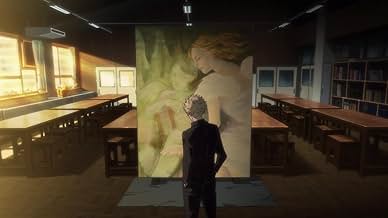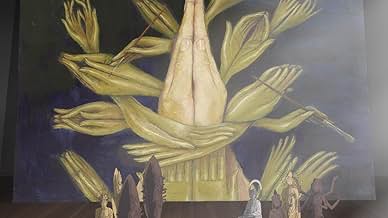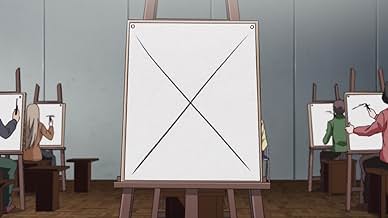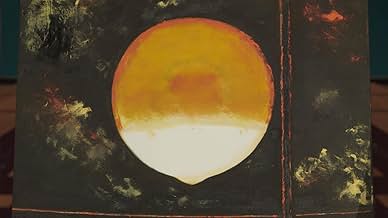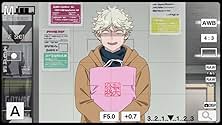CALIFICACIÓN DE IMDb
7.7/10
4.4 k
TU CALIFICACIÓN
Aburrida de la vida, la popular estudiante de instituto Yatora Yaguchi se lanza al bello pero implacable mundo del arte tras encontrar la inspiración en un cuadro.Aburrida de la vida, la popular estudiante de instituto Yatora Yaguchi se lanza al bello pero implacable mundo del arte tras encontrar la inspiración en un cuadro.Aburrida de la vida, la popular estudiante de instituto Yatora Yaguchi se lanza al bello pero implacable mundo del arte tras encontrar la inspiración en un cuadro.
Explorar episodios
Opiniones destacadas
The anime industry's default approach to beloved manga adaptations is to drain them dry of personality, rip their hearts out, and factory-produce them for a market that rewards quantity over quality. Blue Period comes out of the machine an uneven but worthwhile experience regardless of all this.
Yatora Yaguchi is a condescending high school student who prides himself on hard work, rather than relying on natural talent. At the very beginning, he sees a Picasso painting and says to himself smugly, "I could paint that." If you've never picked up a paintbrush, that's an understandable conclusion to reach. After all, people who are good at art are just talented, right? Blue Period strives to destroy this misconception at every chance it gets. The author wanted passionately to convey that art takes time, effort, and a strong work ethic. An unfortunate side effect of condensing a lengthy manga into a measly adaptation is cut content at the expense of this one crucial theme. Despite Blue Period's technical faults, and there are many, its character writing rises to the occasion. Like Yatora, each of their lives is well detailed: We know what motivates them, their concerns about getting into art school, how their family feels about their decisions and all of the turmoil that comes from pursuing their dreams. The show's most compelling theme is talent versus hard work.
In a show about art, there's not enough screentime devoted to the process of creating art. And for an anime about artists, it's about as creatively vacuous as manga adaptations come. Even the untrained eye will notice this anime's an eyesore at times. Nothing is captivating about the visual language. There are no inventive directing choices; every background is drab, unimaginative storyboards, and the editing is lifeless. The character designs aren't very detailed yet they're inconsistently animated. They move like stiff cardboard. The close-ups fail to convey the script's intense emotions because they're flat. Unmoving. Likely they copied shots directly from the source material without considering how color and animation would affect the scene's impact. Having never read the manga, I can only assume poor adaptation choices. The same can't be said for the background music, which isn't haphazardly edited at all. Taiko drums and piano work well here to give seemingly mundane moments an air of melancholy and anxiety.
Drab though it may appear, Blue Period's engrossing story creates tension very well. Yaguchi and his fellow aspiring artists hone their drawing skills in preparation for the competitive Tokyo Art Institute exam. Only a select few are accepted every year-you're never sure if the main characters will fail or succeed. They face constant negative emotions caused by stress, overwork, and self-doubt. Aside from training, the conflict the characters face and problems at home propel the drama and make it consistently engaging to watch.
Yaguchi is a flawed protagonist and a newcomer to art, which makes him the ideal focus for a show about chasing your dream. He said the wrong thing, praising someone when they are comparatively not impressive to other student artists. Yaguchi's mother disapproves of art school at home because his family has a tight budget. But she is supportive upon realizing the effort he puts into his work. His character arc consists of defying his deeply held belief that "People who are true to themselves can't survive." That's the harsh truth for artists, making a living doing what you love is no easy task. The person who originally drew him into the fantastical world of art, Yuka, plays a key role in his development.
Yuka nearly shares the role of the protagonist with Yaguchi-they also want to get into Tokyo Art University. They live with their grandmother, who has high hopes, and parents who disapprove of their lifestyle and choices. Yuka's gender is ambiguous, but they present femininely and don't want to be treated with masculine gender roles. Their gender is a significant detail incorporated into their backstory with sensitivity: they face bigotry, rejection, and insecurities that dig beneath their elegant and confident exterior. Although they hardly get time for character progression due to the disastrous pacing, they are one of the better characters in the show. Though Yuka is a sympathetic character, the show tries to have its cake and eat it too. Yaguchi constantly refers to them as a man with masculine pronouns and by their deadname, Ryuji. No one questions why he uses improper pronouns-the show blames other people in their life who reject their gender identity. We're told Yaguchi feels compassion for them, then his actions make him seem like an asshole. It's detrimental to his character development, and their relationship progression.
Pacing is the most irritating problem with this anime. Originating from the second episode, which rushes past necessary development: Yaguchi struggled to become a better artist, so we're told, but he simply became great in a series of time skips. Skipping his growth goes directly against the story's themes: not everyone has natural talent, and it takes hard work to achieve your aspirations. The studio responsible for this adaptation, Seven Arcs, selected specific story beats but skipped over what they deemed as less important. Rushing through Yaguchi's art training also leaves non-artists in the dark about his processes to create his drawings and paintings. This issue is persistent throughout most of the show. It's not until the last third of the season that we delve deeply into his step-by-step creative method. If the show had put as much emphasis on creating art as its character drama, it'd be great, but significantly longer than 12 episodes.
Blue Period makes a convincing argument for why you should read the manga-and that's ultimately the only reason this anime was made. It doesn't take advantage of the visual medium, but it's a watchable 7/10 anime that could've been a 9/10 anime. In spite of insurmountable odds, its stellar character writing, script, music, and themes make it a success. Shining through a thick layer of grime covering this diamond in the rough is a beautifully relatable story about passionate artists striving for their dreams.
Yatora Yaguchi is a condescending high school student who prides himself on hard work, rather than relying on natural talent. At the very beginning, he sees a Picasso painting and says to himself smugly, "I could paint that." If you've never picked up a paintbrush, that's an understandable conclusion to reach. After all, people who are good at art are just talented, right? Blue Period strives to destroy this misconception at every chance it gets. The author wanted passionately to convey that art takes time, effort, and a strong work ethic. An unfortunate side effect of condensing a lengthy manga into a measly adaptation is cut content at the expense of this one crucial theme. Despite Blue Period's technical faults, and there are many, its character writing rises to the occasion. Like Yatora, each of their lives is well detailed: We know what motivates them, their concerns about getting into art school, how their family feels about their decisions and all of the turmoil that comes from pursuing their dreams. The show's most compelling theme is talent versus hard work.
In a show about art, there's not enough screentime devoted to the process of creating art. And for an anime about artists, it's about as creatively vacuous as manga adaptations come. Even the untrained eye will notice this anime's an eyesore at times. Nothing is captivating about the visual language. There are no inventive directing choices; every background is drab, unimaginative storyboards, and the editing is lifeless. The character designs aren't very detailed yet they're inconsistently animated. They move like stiff cardboard. The close-ups fail to convey the script's intense emotions because they're flat. Unmoving. Likely they copied shots directly from the source material without considering how color and animation would affect the scene's impact. Having never read the manga, I can only assume poor adaptation choices. The same can't be said for the background music, which isn't haphazardly edited at all. Taiko drums and piano work well here to give seemingly mundane moments an air of melancholy and anxiety.
Drab though it may appear, Blue Period's engrossing story creates tension very well. Yaguchi and his fellow aspiring artists hone their drawing skills in preparation for the competitive Tokyo Art Institute exam. Only a select few are accepted every year-you're never sure if the main characters will fail or succeed. They face constant negative emotions caused by stress, overwork, and self-doubt. Aside from training, the conflict the characters face and problems at home propel the drama and make it consistently engaging to watch.
Yaguchi is a flawed protagonist and a newcomer to art, which makes him the ideal focus for a show about chasing your dream. He said the wrong thing, praising someone when they are comparatively not impressive to other student artists. Yaguchi's mother disapproves of art school at home because his family has a tight budget. But she is supportive upon realizing the effort he puts into his work. His character arc consists of defying his deeply held belief that "People who are true to themselves can't survive." That's the harsh truth for artists, making a living doing what you love is no easy task. The person who originally drew him into the fantastical world of art, Yuka, plays a key role in his development.
Yuka nearly shares the role of the protagonist with Yaguchi-they also want to get into Tokyo Art University. They live with their grandmother, who has high hopes, and parents who disapprove of their lifestyle and choices. Yuka's gender is ambiguous, but they present femininely and don't want to be treated with masculine gender roles. Their gender is a significant detail incorporated into their backstory with sensitivity: they face bigotry, rejection, and insecurities that dig beneath their elegant and confident exterior. Although they hardly get time for character progression due to the disastrous pacing, they are one of the better characters in the show. Though Yuka is a sympathetic character, the show tries to have its cake and eat it too. Yaguchi constantly refers to them as a man with masculine pronouns and by their deadname, Ryuji. No one questions why he uses improper pronouns-the show blames other people in their life who reject their gender identity. We're told Yaguchi feels compassion for them, then his actions make him seem like an asshole. It's detrimental to his character development, and their relationship progression.
Pacing is the most irritating problem with this anime. Originating from the second episode, which rushes past necessary development: Yaguchi struggled to become a better artist, so we're told, but he simply became great in a series of time skips. Skipping his growth goes directly against the story's themes: not everyone has natural talent, and it takes hard work to achieve your aspirations. The studio responsible for this adaptation, Seven Arcs, selected specific story beats but skipped over what they deemed as less important. Rushing through Yaguchi's art training also leaves non-artists in the dark about his processes to create his drawings and paintings. This issue is persistent throughout most of the show. It's not until the last third of the season that we delve deeply into his step-by-step creative method. If the show had put as much emphasis on creating art as its character drama, it'd be great, but significantly longer than 12 episodes.
Blue Period makes a convincing argument for why you should read the manga-and that's ultimately the only reason this anime was made. It doesn't take advantage of the visual medium, but it's a watchable 7/10 anime that could've been a 9/10 anime. In spite of insurmountable odds, its stellar character writing, script, music, and themes make it a success. Shining through a thick layer of grime covering this diamond in the rough is a beautifully relatable story about passionate artists striving for their dreams.
Based on a manga series that won the Grand Prize of the 13th Manga Taisho Awards, this revolves around popular second year high school student Yatora Yaguchi. Hard-working Yatora spends his nights hanging out with his friends but still manages to be an honor student. He didn't have an idea what to put on his career planning survey form until he saw an artwork created by Maru Mori, a member of their school art club. He develops a fascination for the arts and joins the club.
Since his parents are not moneyed, he could only hope to go to a public school in college. He sets his sights on Tokyo University of the Arts. To be able to pass the entrance test to TUA, Yatora goes to a prep school where the knowledge he learns in high school is augmented with more advanced techniques.
I love Yatora's introspective journey as he gains more confidence in his talent. The lectures and processes (sketching, use of colors, reviews, etc) are extremely interesting, if not informative. I looked forward to seeing the finished artworks. Yatora does not consider himself talented but is willing to work hard. The support he gets from his teachers push him in the right direction. His friendships with his buddies as well as art classmate cross-dresser Ryuji "Yuka" Ayukawa and the snobby art genius Yotasuke Takahashi are heartwarming.
All in all, this is a lovely and enjoyable watch.
Since his parents are not moneyed, he could only hope to go to a public school in college. He sets his sights on Tokyo University of the Arts. To be able to pass the entrance test to TUA, Yatora goes to a prep school where the knowledge he learns in high school is augmented with more advanced techniques.
I love Yatora's introspective journey as he gains more confidence in his talent. The lectures and processes (sketching, use of colors, reviews, etc) are extremely interesting, if not informative. I looked forward to seeing the finished artworks. Yatora does not consider himself talented but is willing to work hard. The support he gets from his teachers push him in the right direction. His friendships with his buddies as well as art classmate cross-dresser Ryuji "Yuka" Ayukawa and the snobby art genius Yotasuke Takahashi are heartwarming.
All in all, this is a lovely and enjoyable watch.
Aoi Aoi Ano Sora
Amidst of all the art talk, I never expected the direction of this anime nor did I expect to be moved by it this much. Even though it's ironic that the animation was pretty mediocre for an art anime, the masterful character odyssey more than made up for it.
The main characters were high school students who were trying to get into art schools. Through the process of learning about art, each one faced their own struggle in trying to figure out who they are. Again the theme of identity vs role confusion was at the forefront. The journeys that were displayed all led to another common theme that resonated more with me: self-doubt. Our main guy, Yaguchi, constantly felt insecure about himself. Multiple times I can't help but reflect on myself, and it didn't feel so comfortable.
Another aspect was the difference between hard-work, innate talent, and the expectation that came with each label. The character Yotasuke brought out this theme the most. Sometimes being labeled as having talent or already good at something doesn't feel as satisfying as expected.
Overall, an unexpectedly dark, personal, yet satisfying exploration that I never thought I would love so much. 9-9.5/10.
Amidst of all the art talk, I never expected the direction of this anime nor did I expect to be moved by it this much. Even though it's ironic that the animation was pretty mediocre for an art anime, the masterful character odyssey more than made up for it.
The main characters were high school students who were trying to get into art schools. Through the process of learning about art, each one faced their own struggle in trying to figure out who they are. Again the theme of identity vs role confusion was at the forefront. The journeys that were displayed all led to another common theme that resonated more with me: self-doubt. Our main guy, Yaguchi, constantly felt insecure about himself. Multiple times I can't help but reflect on myself, and it didn't feel so comfortable.
Another aspect was the difference between hard-work, innate talent, and the expectation that came with each label. The character Yotasuke brought out this theme the most. Sometimes being labeled as having talent or already good at something doesn't feel as satisfying as expected.
Overall, an unexpectedly dark, personal, yet satisfying exploration that I never thought I would love so much. 9-9.5/10.
What is art and what is uniqueness? Art isn't just painting and it's unique so it doesn't mean that there wasn't anything that inspired the result.
If you want an answer about these " should I watch it, Is it my type, Or Is it worth to watch" I say you should watch it. It might be something you need or like. You might even be attached to it. And if you are planning to give it a try, you should atleast watch 3 episode. Afterwards it will hit to you surely.
Sometimes it goes deep into story telling and human thinking and emotions, which hit's.
There is a lot you can learn about art and painting from it. It's an obvious answer.
You can learn what's going on in painters mind while the person is making the art.
While all the praise being done. It's not a typical series which you get entertainment and stuff.
And it's also not mind blowing or masterpiece. It makes an mood seeing the story so you don't need to prepare your mind that you are watching something different than others.
After all of this I will say that it will make your time. I would recommend a binge watch.
I will give it a rating of 7.6
It is my very first review, so if you are reading this I would like to thank you.
And a gift from me in this internet orianted world be some high class recommendation, from different genra and mediums.
Charlie.
Erased.
The Butterfly Effect.
Horimiya.
Evaru.
Spider-Man: Into the Spider-Verse.
Joji.
Heavenly Delusion.
Hridayam.
Summer Time Rendering.
Love scenery.
5 centimeters per second.
Bangalore Days.
Mukundan Unni Associates..
If you want an answer about these " should I watch it, Is it my type, Or Is it worth to watch" I say you should watch it. It might be something you need or like. You might even be attached to it. And if you are planning to give it a try, you should atleast watch 3 episode. Afterwards it will hit to you surely.
Sometimes it goes deep into story telling and human thinking and emotions, which hit's.
There is a lot you can learn about art and painting from it. It's an obvious answer.
You can learn what's going on in painters mind while the person is making the art.
While all the praise being done. It's not a typical series which you get entertainment and stuff.
And it's also not mind blowing or masterpiece. It makes an mood seeing the story so you don't need to prepare your mind that you are watching something different than others.
After all of this I will say that it will make your time. I would recommend a binge watch.
I will give it a rating of 7.6
It is my very first review, so if you are reading this I would like to thank you.
And a gift from me in this internet orianted world be some high class recommendation, from different genra and mediums.
Charlie.
Erased.
The Butterfly Effect.
Horimiya.
Evaru.
Spider-Man: Into the Spider-Verse.
Joji.
Heavenly Delusion.
Hridayam.
Summer Time Rendering.
Love scenery.
5 centimeters per second.
Bangalore Days.
Mukundan Unni Associates..
Great narration. First episode is enough to make a strong impression in viewers' heart and mind. I loved the concept and execution overall. Wonderful 👍
¿Sabías que…?
- ConexionesRemade as Blue Period (2024)
Selecciones populares
Inicia sesión para calificar y agrega a la lista de videos para obtener recomendaciones personalizadas
- How many seasons does Blue Period have?Con tecnología de Alexa
Detalles
- Fecha de lanzamiento
- País de origen
- Sitio oficial
- Idiomas
- También se conoce como
- الفترة الزرقاء
- Locaciones de filmación
- Tokio, Japón(Studio)
- Productora
- Ver más créditos de la compañía en IMDbPro
- Tiempo de ejecución
- 24min
- Color
- Mezcla de sonido
Contribuir a esta página
Sugiere una edición o agrega el contenido que falta



